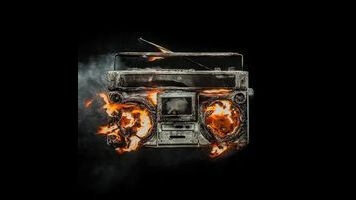Green Day are punks afraid of dying on the uncertain Revolution Radio

Pity the punk who grows up but doesn’t grow accustomed to mortality. Not in a “rage, rage against the dying of the light” kind of way, but more the “sitting in the all-ages hardcore show basement, wondering why you still feel the same” mentality. Billie Joe Armstrong’s concerns are still largely the same as those throughout most of his career—teen angst, shitty families, coloring outside the lines of whatever the hell “mainstream society” means anymore, and so on—but now they’re tempered by an obsession with the passing of time, and a lack of humor. Revolution Radio, the band’s solid but sometimes unfocused new album, can’t stop looking to the past, to the present, anywhere but the future. Armstrong often employs characters in his lyrics, giving voice to their worries and anxieties, but as with American Idiot, these other personalities mostly function as a conduit for his own pathos. More than ever, he’s becoming a kind of ersatz Springsteen for the aging punk generation—semi-adolescents getting older and less sure about what drives their anger, but knowing each passing year brings them closer to never knowing.
The band is hitting its catchy but predictable musical marks harder than ever, a gesture of defiance against the increasing uncertainty of the lyrics. The clearest songs on the album are those that turn to youth, reminiscences of days gone by from souls who feel as though the encroaching decay of age is a challenge to their very being. “Outlaws,” a stately rocker that chimes with major-chord uplift, gazes upon the punk-kid past with a nostalgia firmly clad in rose-tinted goggles. And that romanticization of youth is echoed throughout the record, from the girl-I-love sass of “Youngblood” and its two-chord simplicity to “Too Dumb To Die,” a rueful look back at friends, family, and the vagaries of time, wedded to a start-stop guitar riff and earnest handclap transitions.
But time catches up with everyone, and Green Day doesn’t sound happy about it. When the attention turns to contemporary concerns, the record develops a fragmented, vague sense of unease, with songs that fume and fuss musically, but become unclear narratively and emotionally, other than a thoroughgoing veil of worry. “Bang Bang” is the exception, a shout-along ’80s punk rave-up, its SoCal mohawk of a melody carrying a vocal castigation of gun violence in the age of Instagram. But mostly, the album seethes with midtempo stompers fearful of the world and what the future holds. “Say Goodbye” is the closest thing to an explicitly political song, but its milquetoast critique of institutional violence (“violence on the rise… sing along to the cops on patrol”) is a pale shadow of the explicit attacks contained in something like “Holiday.”
The best tracks cry with the frustration of someone who simply can’t resign themselves to their world, their place in it, and most of all, themselves. “Still Breathing” is a statement of purpose for the record; it’s an acknowledgement that most of the time, all we have to hang on to is the knowledge that we’re still alive, still struggling. “Forever Now” functions as a penultimate answer to opener “Somewhere Now,” repeating lines but changing the dullness of life to an assurance of fullness, an odd sentiment in a song demanding a “better way to die.” And the album closer is an acoustic ballad two steps from being played on a ukulele, an innocent assurance that everything is all right that rings hollow in the face of everything preceding it. But that’s one of Green Day’s strengths: Billie Joe spouts platitudes regularly, but he never seems to believe them. Every embrace of Beach Boy harmonies and hook-driven sing-alongs is belied by a bleak worldview—one that knows, despite all assurances, it’s never going to be just all right.
Buy Revolution Radio here, which helps support The A.V. Club.